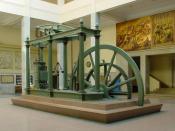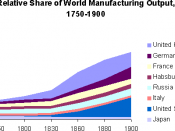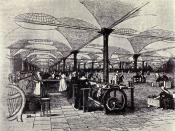Although Britain led the way into the Industrial Revolution, much of Europe followed and eventually surpassed Britain. Germany became unified under Kaiser Wilhelm and Prime Minister Otto von Bismarck in 1871, and had a larger industrial output then Britain. France, although not as powerful as Germany, still had a greater industrial output then Britain. With the exception of America, which was still founded by people of European ancestry, all of Western Europe was politically and socially more developed then the rest of the world.
During Europe'sIndustrial Revolution, they had achieved: consolidated nation-states, parliamentary democracies, bureaucratic administrations, freedom of press, assembly and religion; freedom from wrongful arrest and torture, increased levels of literacy and general public education, high levels of trade and international exchange, high levels of economic entrepreneurship and legal protection of property, humanitarian rights, and thriving artistic life. As a result of Europe's industrialization, they controlled direct or indirectly 85% of the land throughout the world.
Another result is that other countries began an industrial revolution.


